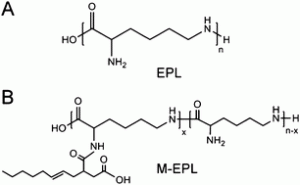Scientists from New Jersey, America, have reported that modified 3-polylysine (M-EPL) can improve the water solubility of poorly-soluble bioactive compounds. The discovery suggests that M-EPL could potentially be used as a biopolymer to deliver poorly soluble drugs thereby improving their bioactivities.
 At concentrations above the critical aggregation concentration, M-EPL forms a polymer micelle in aqueous solutions of size 2.4-2.6 nm, which upon further aggregation results in micelles of radius 26.8-30.8 nm as determined by synchrotron small-angle X-ray scattering (SAXS). It was found that the M-EPL micelles were able to capture and solubilize compounds such as curcuminoids, which are ordinarily water-insoluble. This finding is of interest because curcuminoids (extracted from tumeric) have shown anti-inflammatory, anti-cancer, antioxidant and antimicrobial activity, but their use as drug candidates is hindered by their very poor solubility.
At concentrations above the critical aggregation concentration, M-EPL forms a polymer micelle in aqueous solutions of size 2.4-2.6 nm, which upon further aggregation results in micelles of radius 26.8-30.8 nm as determined by synchrotron small-angle X-ray scattering (SAXS). It was found that the M-EPL micelles were able to capture and solubilize compounds such as curcuminoids, which are ordinarily water-insoluble. This finding is of interest because curcuminoids (extracted from tumeric) have shown anti-inflammatory, anti-cancer, antioxidant and antimicrobial activity, but their use as drug candidates is hindered by their very poor solubility.
To find out more, read the article in full for free by following the link below:
Structure of modified 3-polylysine micelles and their application in improving cellular antioxidant activity of curcuminoids
H. Yu, J. Li, K. Shi and Q. Huang, Food Funct., 2011, DOI: 10.1039/c1fo10053j










